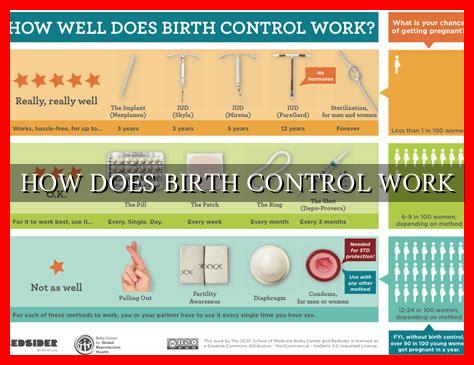-
Table of Contents
How Does Birth Control Work
Birth control, also known as contraception, is a method used to prevent pregnancy. There are various types of birth control available, each working in different ways to prevent conception. Understanding how birth control works is essential for individuals to make informed decisions about their reproductive health.
Hormonal Methods
Hormonal birth control methods work by altering a woman’s hormone levels to prevent ovulation, fertilization, or implantation of a fertilized egg. These methods include:
- Birth Control Pills: Oral contraceptives contain synthetic hormones that prevent ovulation and thicken cervical mucus to block sperm.
- Birth Control Patch: A patch worn on the skin releases hormones to prevent ovulation.
- Birth Control Shot: A hormonal injection that prevents ovulation for up to three months.
- Birth Control Implant: A small rod inserted under the skin that releases hormones to prevent ovulation for several years.
Barrier Methods
Barrier methods of birth control work by physically blocking sperm from reaching an egg. These methods include:
- Condoms: Male and female condoms create a barrier that prevents sperm from entering the uterus.
- Diaphragm: A silicone cup inserted into the vagina to cover the cervix and block sperm.
- Cervical Cap: A smaller silicone cap that covers the cervix to prevent sperm from entering the uterus.
Intrauterine Devices (IUDs)
IUDs are small, T-shaped devices inserted into the uterus to prevent pregnancy.
. There are two types of IUDs:
- Hormonal IUD: Releases hormones to prevent ovulation and thicken cervical mucus.
- Copper IUD: Releases copper ions that are toxic to sperm, preventing fertilization.
Sterilization
Sterilization is a permanent form of birth control that involves blocking or sealing the fallopian tubes to prevent sperm from reaching an egg. This can be done through tubal ligation for women or vasectomy for men.
Emergency Contraception
Emergency contraception, also known as the morning-after pill, is a method used to prevent pregnancy after unprotected sex. It works by delaying ovulation or preventing fertilization of an egg.
Conclusion
Understanding how birth control works is crucial for individuals to make informed decisions about their reproductive health. Whether using hormonal methods, barrier methods, IUDs, sterilization, or emergency contraception, there are various options available to prevent pregnancy. It is essential to consult with a healthcare provider to determine the most suitable method based on individual needs and preferences.
For more information on birth control methods and their effectiveness, visit Planned Parenthood.





